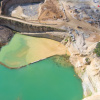In March 2014, the EU Commission published a proposal on conflict minerals reporting, criticized by some as falling behind both expectations and comparable regulation in the U.S. Driven by a steady growth in global demand, prices for metallic raw materials have risen over the past years. The exploitation of raw materials is becoming increasingly widespread in ecologically sensitive and politically unstable regions, where environmental and social standards governing the exploitation of raw materials are often insufficient or absent. “Conflict minerals” are minerals, usually from mining operations in the Democratic Republic of Congo and neighbouring countries, mined in conditions of human rights violations and armed conflict. The profits from raw material extraction in that region benefit armed groups and are often used to finance regional conflicts.
To tackle the issue, the UN Group of Experts on the Democratic Republic of the Congo developed the concept of due diligence. It was soon followed by the Dodd-Frank Act in 2010 and the OECD Due Diligence Guidance for Responsible Supply Chains of Minerals from Conflict-Affected and High Risk Areas in 2011. While the Due Diligence approach by the OECD is of a voluntary nature, Section 1502 of the Dodd-Frank Act requires all companies traded and listed on the US stock exchange market to provide disclosures on certain conflict minerals, such as columbite-tantalite (used for tantalum), cassiterite (tin), gold and wolframite (tungsten) from identified conflict regions, fostering transparency in the sector and accountability of the involved companies.
In response to international efforts to cut the links between resource extraction and conflict financing, Catherine Ashton announced a European initiative to better influence and control the trading of conflict minerals on the European market. In March 2014, the Commission drafted a regulation for an EU-wide system of self-certification for importers of tin, tantalum, tungsten, gold and their ores, and plans to publish a list of responsible smelters and refiners. After an ongoing review process, the proposed regulation is to be sent to the European Parliament and the Council later in 2014 and implemented in 2015.
While several campaign groups and members of the European Parliament criticized the Commission’s proposal as too soft, EU officials highlight that media attention and public pressure on the companies might be motivation enough to join the initiative. Contentious issues include:
• In contrast to the Dodd-Frank Act, the EU approach is voluntary, offering companies the choice to opt in and report on their supply chain due diligence policies and practices. In a former version of the draft regulation, as reported by EurActiv, the document read as “three years after the entry into force of this regulation, the voluntary scheme will automatically become mandatory”. In comparison, the published draft regulation only states that follow-up reports may be accompanied by legislation including “mandatory measures”.
• The draft focusses on Europe-based businesses in the raw material sector and not on those businesses - especially smelters and refiners - that are dealing with already finished manufactured products. However, the latter import products that could make use of “conflict minerals”, such as mobile phones.
• The number of metals listed in the draft regulation is low and precious stones, for example, are not included.
The final nature of the initiative remains to be seen and its functioning can most likely only be assessed after several years of implementation.





